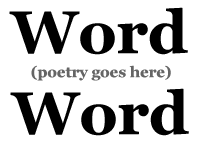 Pinsky’s praise of difficult poetry last week is commendable in its way. He serves up a hodge podge of interesting verse that requires something back from the reader–more than what most celebrations of NaPoMo attempted. That said, he doesn’t really go much further than that toward making the argument for difficulty. He seems to define difficulty in opposition to poems that are genial and soothing, with easy meaning. This is a particular mode of poetry, suitable to some tasks, but far from an over-arching principle. It is a bit like praising the use of many of colors in painting, rather than just sticking, say, to purple. Some people like purple, some like genial–but we all know that’s hardly the extent of the art.
Pinsky’s praise of difficult poetry last week is commendable in its way. He serves up a hodge podge of interesting verse that requires something back from the reader–more than what most celebrations of NaPoMo attempted. That said, he doesn’t really go much further than that toward making the argument for difficulty. He seems to define difficulty in opposition to poems that are genial and soothing, with easy meaning. This is a particular mode of poetry, suitable to some tasks, but far from an over-arching principle. It is a bit like praising the use of many of colors in painting, rather than just sticking, say, to purple. Some people like purple, some like genial–but we all know that’s hardly the extent of the art.
There are two kinds of difficulty, as I see it. On the one hand, we have difficulty as a way of saying we require the reader to bring some effort or energy to the poem. Here, the payoff for such effort must be equal or greater to the effort expended. This is the healthy, respectful kind of disregard for one’s reader also known as artistic integrity.
But there is another, more detrimental mode of difficulty where the writer is building walls. Such poems can actually still matter, if the poetic compensation (as in sound, rhythm, and the shimmer of inferred meaning, independent of literal meaning) is enough to carry readers through a sufficiently complex and enjoyable experience independent of the author’s intent. But the practice of enigmatology for its own sake does more harm to the art, frankly, than the sing-song banal. Only good poets get alienated by bad poetry. Everyone gets alienated by insular arrogance. (Just not everyone is brave enough to admit it.)
Claudia Emerson does a bang-up job of putting all the “accessibility versus difficulty” squabbling to rest when she points out that it is really not so much difficulty as complexity that we should strive for in a poem. This is much more than just a semantic distinction. It is a guidepost away from the dark side of difficulty, toward the territory of the real (which we all know is stranger than fiction, especially the interior “real”).
I stumbled upon my senior thesis from my undergraduate days: “The Ineffable In The Sonnet Sequences Of Dante, Petrarch and Sidney.” It occurs to me that in contemporary poetry, we no longer take the liberty of the “audience aside” to bemoan the inadequacy of our words. In a sense, I suppose, the turn toward language poetry does this in its way–focusing so intently on language as to exacerbate its absurd inadequacy. But since the Romantic period, which was rife with anguished outburst (an entire dissertation could be written, if it hasn’t already, on the use of the exclamation “O!”)–we haven’t really held up non-speaking with such loud reverence.
Yet it seems to me that is precisely what we are trying to get at with purple prose. If there is not some fundamental, intangible, indeed ineffable thought, feeling or experience motivating the writing process, how can we claim our poetry to be anything more than a decorative art, a shuffling around of words?
In striving toward this necessarily impossible aim that we might rephrase a principle attributed to Einstein: make the poem as complex as necessary, and no more. Opposite our rendering of complexity, the poem must reach its reader. Yet in striving toward the ineffable, we must make our work both as simple as possible, and as complex as necessary. Opposite our striving for clarity, the poem must remain true to itself.
This push-pull relationship between the idea of the reader and the integrity of the intangible subject is what makes writing even a single poem that matters a remarkably profound pursuit. It is also what makes each attempt so immensely pleasurable, infinitely more so than simply living and thinking in ways unexamined and unexpressed. So let us praise not only difficult poetry, but the beautiful dance between what can not be said and how much we need to say it.